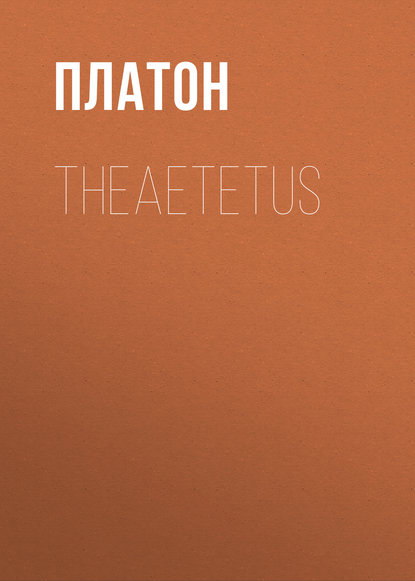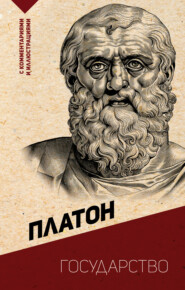По всем вопросам обращайтесь на: info@litportal.ru
(©) 2003-2024.
✖
Theaetetus
Настройки чтения
Размер шрифта
Высота строк
Поля
THEAETETUS: I do my best.
SOCRATES: Yes, my boy, and so do I; and my desire is to learn of him, or of anybody who seems to understand these things. And I get on pretty well in general; but there is a little difficulty which I want you and the company to aid me in investigating. Will you answer me a question: 'Is not learning growing wiser about that which you learn?'
THEAETETUS: Of course.
SOCRATES: And by wisdom the wise are wise?
THEAETETUS: Yes.
SOCRATES: And is that different in any way from knowledge?
THEAETETUS: What?
SOCRATES: Wisdom; are not men wise in that which they know?
THEAETETUS: Certainly they are.
SOCRATES: Then wisdom and knowledge are the same?
THEAETETUS: Yes.
SOCRATES: Herein lies the difficulty which I can never solve to my satisfaction – What is knowledge? Can we answer that question? What say you? which of us will speak first? whoever misses shall sit down, as at a game of ball, and shall be donkey, as the boys say; he who lasts out his competitors in the game without missing, shall be our king, and shall have the right of putting to us any questions which he pleases…Why is there no reply? I hope, Theodorus, that I am not betrayed into rudeness by my love of conversation? I only want to make us talk and be friendly and sociable.
THEODORUS: The reverse of rudeness, Socrates: but I would rather that you would ask one of the young fellows; for the truth is, that I am unused to your game of question and answer, and I am too old to learn; the young will be more suitable, and they will improve more than I shall, for youth is always able to improve. And so having made a beginning with Theaetetus, I would advise you to go on with him and not let him off.
SOCRATES: Do you hear, Theaetetus, what Theodorus says? The philosopher, whom you would not like to disobey, and whose word ought to be a command to a young man, bids me interrogate you. Take courage, then, and nobly say what you think that knowledge is.
THEAETETUS: Well, Socrates, I will answer as you and he bid me; and if I make a mistake, you will doubtless correct me.
SOCRATES: We will, if we can.
THEAETETUS: Then, I think that the sciences which I learn from Theodorus – geometry, and those which you just now mentioned – are knowledge; and I would include the art of the cobbler and other craftsmen; these, each and all of, them, are knowledge.
SOCRATES: Too much, Theaetetus, too much; the nobility and liberality of your nature make you give many and diverse things, when I am asking for one simple thing.
THEAETETUS: What do you mean, Socrates?
SOCRATES: Perhaps nothing. I will endeavour, however, to explain what I believe to be my meaning: When you speak of cobbling, you mean the art or science of making shoes?
THEAETETUS: Just so.
SOCRATES: And when you speak of carpentering, you mean the art of making wooden implements?
THEAETETUS: I do.
SOCRATES: In both cases you define the subject matter of each of the two arts?
THEAETETUS: True.
SOCRATES: But that, Theaetetus, was not the point of my question: we wanted to know not the subjects, nor yet the number of the arts or sciences, for we were not going to count them, but we wanted to know the nature of knowledge in the abstract. Am I not right?
THEAETETUS: Perfectly right.
SOCRATES: Let me offer an illustration: Suppose that a person were to ask about some very trivial and obvious thing – for example, What is clay? and we were to reply, that there is a clay of potters, there is a clay of oven-makers, there is a clay of brick-makers; would not the answer be ridiculous?
THEAETETUS: Truly.
SOCRATES: In the first place, there would be an absurdity in assuming that he who asked the question would understand from our answer the nature of 'clay,' merely because we added 'of the image-makers,' or of any other workers. How can a man understand the name of anything, when he does not know the nature of it?
THEAETETUS: He cannot.
SOCRATES: Then he who does not know what science or knowledge is, has no knowledge of the art or science of making shoes?
THEAETETUS: None.
SOCRATES: Nor of any other science?
THEAETETUS: No.
SOCRATES: And when a man is asked what science or knowledge is, to give in answer the name of some art or science is ridiculous; for the question is, 'What is knowledge?' and he replies, 'A knowledge of this or that.'
THEAETETUS: True.
SOCRATES: Moreover, he might answer shortly and simply, but he makes an enormous circuit. For example, when asked about the clay, he might have said simply, that clay is moistened earth – what sort of clay is not to the point.
THEAETETUS: Yes, Socrates, there is no difficulty as you put the question. You mean, if I am not mistaken, something like what occurred to me and to my friend here, your namesake Socrates, in a recent discussion.
SOCRATES: What was that, Theaetetus?
THEAETETUS: Theodorus was writing out for us something about roots, such as the roots of three or five, showing that they are incommensurable by the unit: he selected other examples up to seventeen – there he stopped. Now as there are innumerable roots, the notion occurred to us of attempting to include them all under one name or class.
SOCRATES: And did you find such a class?
THEAETETUS: I think that we did; but I should like to have your opinion.
SOCRATES: Let me hear.
THEAETETUS: We divided all numbers into two classes: those which are made up of equal factors multiplying into one another, which we compared to square figures and called square or equilateral numbers; – that was one class.
SOCRATES: Very good.
THEAETETUS: The intermediate numbers, such as three and five, and every other number which is made up of unequal factors, either of a greater multiplied by a less, or of a less multiplied by a greater, and when regarded as a figure, is contained in unequal sides; – all these we compared to oblong figures, and called them oblong numbers.
SOCRATES: Capital; and what followed?
THEAETETUS: The lines, or sides, which have for their squares the equilateral plane numbers, were called by us lengths or magnitudes; and the lines which are the roots of (or whose squares are equal to) the oblong numbers, were called powers or roots; the reason of this latter name being, that they are commensurable with the former [i.e., with the so-called lengths or magnitudes] not in linear measurement, but in the value of the superficial content of their squares; and the same about solids.
SOCRATES: Excellent, my boys; I think that you fully justify the praises of Theodorus, and that he will not be found guilty of false witness.

















